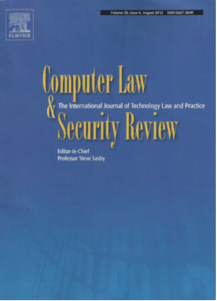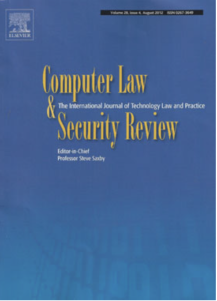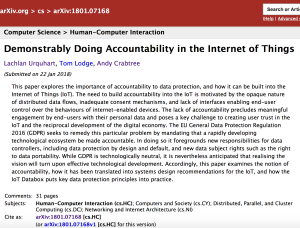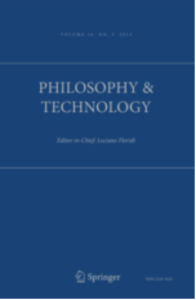
There have been a few research papers released since my last blog post so thought it was about time to do a round-up of the links. Get in touch to let me know your thoughts on any of them!
[1] Title: Avoiding the Internet of Insecure Industrial Things
Authors: Lachlan Urquhart and Derek McAuley
Journal: Computer Law and Security Review [Elsevier] [PDF – Open Access]
Date: Jan 2018
Abstract: Security incidents such as targeted distributed denial of service (DDoS) attacks on power grids and hacking of factory industrial control systems (ICS) are on the increase. This paper unpacks where emerging security risks lie for the industrial internet of things, drawing on both technical and regulatory perspectives. Legal changes are being ushered by the European Union (EU) Network and Information Security (NIS) Directive 2016 and the General Data Protection Regulation 2016 (GDPR) (both to be enforced from May 2018). We use the case study of the emergent smart energy supply chain to frame, scope out and consolidate the breadth of security concerns at play, and the regulatory responses. We argue the industrial IoT brings four security concerns to the fore, namely: appreciating the shift from offline to online infrastructure; managing temporal dimensions of security; addressing the implementation gap for best practice; and engaging with infrastructural complexity. Our goal is to surface risks and foster dialogue to avoid the emergence of an Internet of Insecure Industrial Things.
[2] Title: Building accountability into the Internet of Things: the IoT Databox model
Journal: J. of Reliable Intelligent Environments [Springer] [PDF – Open Access]
Date: Jan 2018

Abstract: This paper outlines the IoT Databox model as a means of making the Internet of Things (IoT) accountable to individuals. Accountability is a key to building consumer trust and is mandated by the European Union’s general data protection regulation (GDPR). We focus here on the ‘external’ data subject accountability requirement specified by GDPR and how meeting this requirement turns on surfacing the invisible actions and interactions of connected devices and the social arrangements in which they are embedded. The IoT Databox model is proposed as an in principle means of enabling accountability and providing individuals with the mechanisms needed to build trust into the IoT.
[3] Title: Demonstrably Doing Accountability in the Internet of Things
Authors: Lachlan Urquhart, Tom Lodge, Andy Crabtree
Journal: Under Review [currently on arXiv] [PDF]
Date: Submitted Dec 2017
 Abstract: This paper explores the importance of accountability to data protection, and how it can be built into the Internet of Things (IoT). The need to build accountability into the IoT is motivated by the opaque nature of distributed data flows, inadequate consent mechanisms, and lack of interfaces enabling end-user control over the behaviours of internet-enabled devices. The lack of accountability precludes meaningful engagement by end-users with their personal data and poses a key challenge to creating user trust in the IoT and the reciprocal development of the digital economy. The EU General Data Protection Regulation 2016 (GDPR) seeks to remedy this particular problem by mandating that a rapidly developing technological ecosystem be made accountable. In doing so it foregrounds new responsibilities for data controllers, including data protection by design and default, and new data subject rights such as the right to data portability. While GDPR is technologically neutral, it is nevertheless anticipated that realising the vision will turn upon effective technological development. Accordingly, this paper examines the notion of accountability, how it has been translated into systems design recommendations for the IoT, and how the IoT Databox puts key data protection principles into practice.
Abstract: This paper explores the importance of accountability to data protection, and how it can be built into the Internet of Things (IoT). The need to build accountability into the IoT is motivated by the opaque nature of distributed data flows, inadequate consent mechanisms, and lack of interfaces enabling end-user control over the behaviours of internet-enabled devices. The lack of accountability precludes meaningful engagement by end-users with their personal data and poses a key challenge to creating user trust in the IoT and the reciprocal development of the digital economy. The EU General Data Protection Regulation 2016 (GDPR) seeks to remedy this particular problem by mandating that a rapidly developing technological ecosystem be made accountable. In doing so it foregrounds new responsibilities for data controllers, including data protection by design and default, and new data subject rights such as the right to data portability. While GDPR is technologically neutral, it is nevertheless anticipated that realising the vision will turn upon effective technological development. Accordingly, this paper examines the notion of accountability, how it has been translated into systems design recommendations for the IoT, and how the IoT Databox puts key data protection principles into practice.
[4] Title: Accessing Online Data for Youth Mental Health Research: Meeting the Ethical Challenges
Journal: Philosophy and Technology [Springer] [PDF – Open Access]
Data: Oct 2017
 Abstract: This article addresses the general ethical issues of accessing online personal data for research purposes. The authors discuss the practical aspects of online research with a specific case study that illustrates the ethical challenges encountered when accessing data from Kooth, an online youth web-counselling service. This paper firstly highlights the relevance of a process-based approach to ethics (Markham and Buchanan 2012) when accessing highly sensitive data and then discusses the ethical considerations and potential challenges regarding the accessing of public data from Digital Mental Health (DMH) services. It presents solutions that aim to protect young DMH service users as well as the DMH providers and researchers mining such data. Special consideration is given to service users’ expectations of what their data might be used for, as well as their perceptions of whether the data they post is public, private or open. We provide recommendations for planning and designing online research that includes vulnerable young people as research participants in an ethical manner. We emphasise the distinction between public, private and open data, which is crucial to comprehend the ethical challenges in accessing DMH data. Among our key recommendations, we foreground the need to consider a collaborative approach with the DMH providers while respecting service users’ control over personal data, and we propose the implementation of digital solutions embedded within the platform for explicit opt-out/opt-in recruitment strategies and ‘read more’ options (Bergin and Harding 2016).
Abstract: This article addresses the general ethical issues of accessing online personal data for research purposes. The authors discuss the practical aspects of online research with a specific case study that illustrates the ethical challenges encountered when accessing data from Kooth, an online youth web-counselling service. This paper firstly highlights the relevance of a process-based approach to ethics (Markham and Buchanan 2012) when accessing highly sensitive data and then discusses the ethical considerations and potential challenges regarding the accessing of public data from Digital Mental Health (DMH) services. It presents solutions that aim to protect young DMH service users as well as the DMH providers and researchers mining such data. Special consideration is given to service users’ expectations of what their data might be used for, as well as their perceptions of whether the data they post is public, private or open. We provide recommendations for planning and designing online research that includes vulnerable young people as research participants in an ethical manner. We emphasise the distinction between public, private and open data, which is crucial to comprehend the ethical challenges in accessing DMH data. Among our key recommendations, we foreground the need to consider a collaborative approach with the DMH providers while respecting service users’ control over personal data, and we propose the implementation of digital solutions embedded within the platform for explicit opt-out/opt-in recruitment strategies and ‘read more’ options (Bergin and Harding 2016).
Originally posted at https://lachlansresearch.com/2018/02/06/round-up-of-recent-research-papers/
https://lachlansresearch.com/2018/02/06/round-up-of-recent-research-papers/